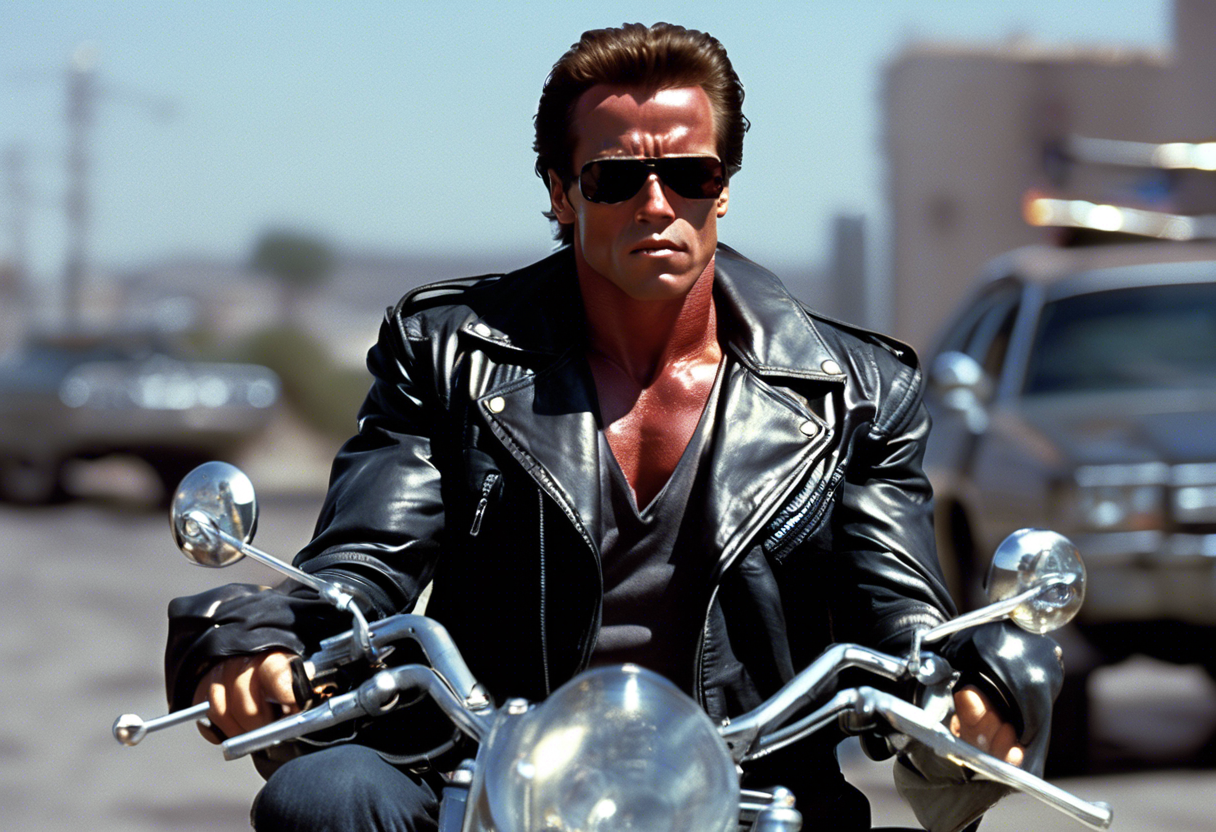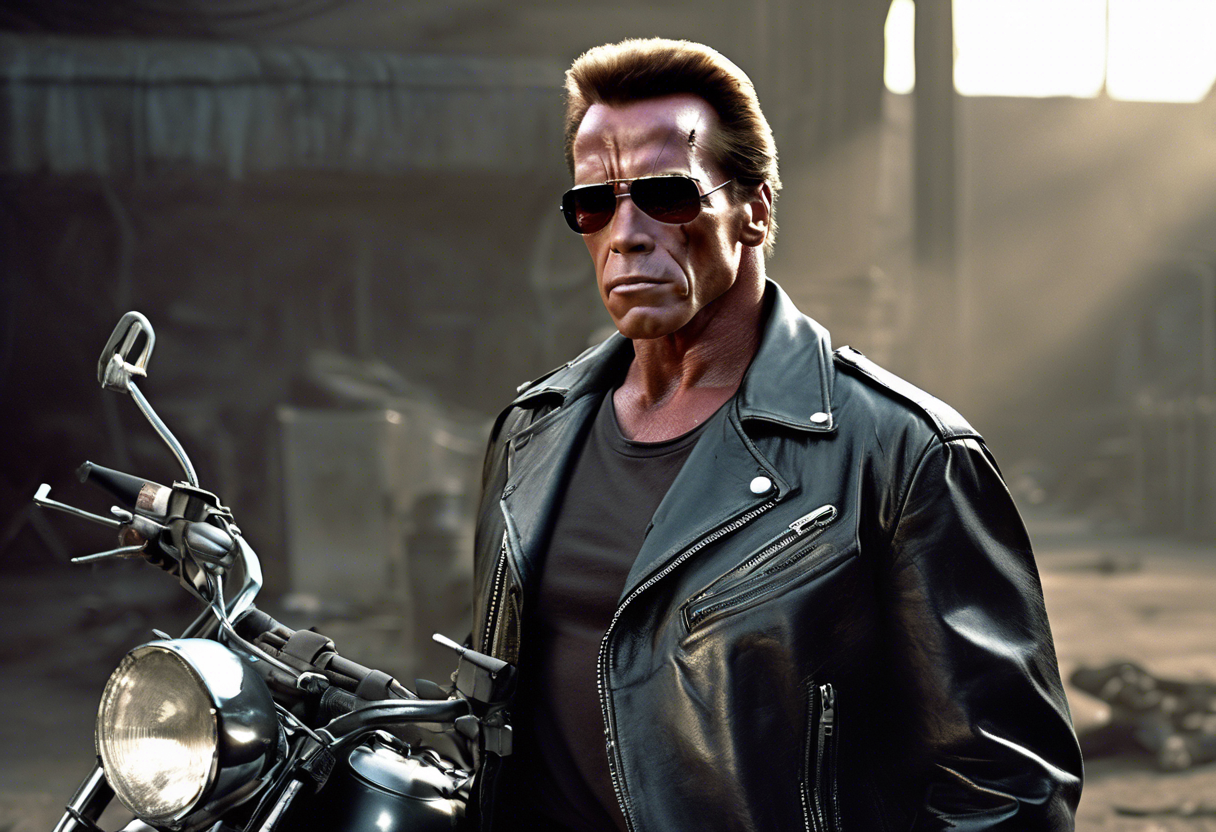Contents
Introduction
The Terminator, also known as the Cyberdyne Systems Model 101 or T-800, is a central character in the 1984 film The Terminator, directed and co-written by James Cameron. This autonomous cyborg is a virtually indestructible soldier, infiltrator, and assassin created by the artificial intelligence Skynet in a post-apocalyptic future. The Terminator’s role in the narrative is pivotal, serving as the main antagonist who is sent back in time to kill Sarah Connor, the future mother of the leader of the human resistance against the machines.
The character’s creation and backstory are deeply rooted in the dystopian future where Skynet, after launching a nuclear war against humans, develops Terminators to aid in its quest to eradicate humanity. The T-800 model, portrayed by Arnold Schwarzenegger, is the first of these cyborgs introduced in the franchise. The Terminator’s defining traits include its human appearance, courtesy of living tissue over a metal endoskeleton, super strength, and an unyielding commitment to its mission [4][5].
Role in the Story
In The Terminator, the T-800 is sent back in time to 1984 to kill Sarah Connor, whose son John will one day lead the human resistance against Skynet. The Terminator’s journey begins with its arrival in Los Angeles, where it promptly kills several individuals to acquire clothes and weapons. It then sets out to locate Sarah, using its advanced capabilities and relentless pursuit to track her down.
The Terminator’s actions drive the plot, creating a cat-and-mouse scenario between itself and Kyle Reese, a soldier also sent back in time to protect Sarah. The Terminator’s interactions with other characters, particularly its brutal and efficient killings, highlight its single-minded focus on completing its mission. Key events include its attack on the police station, where it kills several officers, and its final confrontation with Sarah and Kyle at a factory, where it is ultimately destroyed [1][3].
Character Analysis
The Terminator is characterized by its emotionlessness and lack of human empathy. It is a machine designed to kill, with no capacity for pity, remorse, or fear. This is evident in its actions, such as killing street punks and a gun store owner without hesitation. The Terminator’s personality is defined by its programming and mission, making it a relentless and unstoppable force.
Despite its mechanical nature, the Terminator’s presence is compelling due to its imposing physique and the believability of its brute force, thanks to Arnold Schwarzenegger’s portrayal. The character’s strengths lie in its durability and ability to withstand significant damage, while its flaws are largely tied to its predictability and lack of adaptability beyond its programming [3][5].
Themes and Symbolism
The Terminator embodies several themes and symbolic elements that contribute to the movie’s overarching message. It represents the dangers of unchecked technological advancement and the potential for machines to surpass and threaten human existence. The character also symbolizes the inevitability of fate and the consequences of playing with forces beyond human control.
The Terminator’s relentless pursuit of Sarah Connor serves as a metaphor for the unstoppable nature of technological progress and the futility of human resistance against it. The character’s cyborg nature, blending human and machine, raises questions about what it means to be human and the ethics of creating machines that can mimic human life [1][4].
Cultural Impact
The Terminator has had a profound cultural impact since its introduction in 1984. The character has become an iconic figure in science fiction, symbolizing both the fears and the fascination with advanced technology. The Terminator’s catchphrases, such as "I’ll be back," have become ingrained in popular culture.
The character has been portrayed in various adaptations and spin-offs, including sequels like Terminator 2: Judgment Day and Terminator: Dark Fate, where the T-800 transitions from an antagonist to a protector. This versatility has contributed to the character’s enduring appeal and influence on other works in the science fiction genre [2][5].
Critical Reception
The Terminator has received widespread critical acclaim for its portrayal by Arnold Schwarzenegger. Critics have praised the character’s emotionless demeanor and the physical presence that makes the Terminator’s actions believable and intimidating. The character’s role in the film has been analyzed for its contribution to the narrative’s tension and the exploration of themes related to technology and humanity.
Some critics have noted the simplicity yet effectiveness of the Terminator’s character, highlighting how its single-minded purpose drives the plot and creates a compelling antagonist. Over time, the character has become a cultural icon, with various interpretations and analyses focusing on its symbolic and thematic significance [2][3].
Legacy
The Terminator’s legacy is marked by its enduring appeal and influence on popular culture. The character has inspired numerous other works in science fiction, including films, television shows, and literature. The T-800’s archetype as a relentless, technologically advanced killer has been referenced and parodied in many forms of media.
The character remains relevant in contemporary discussions about artificial intelligence, robotics, and the ethics of technological advancement. The Terminator’s impact on the science fiction genre is undeniable, and it continues to be a central figure in the ongoing exploration of human-machine relationships and the potential dangers of advanced technology [4][5].
References
- https://www.shmoop.com/study-guides/terminator/sarah-connor.html
- https://screenrant.com/terminator-franchise-sarah-connor-best-action-hero-t800-antagonist/
- https://www.shmoop.com/study-guides/terminator/characterization.html
- https://en.wikipedia.org/wiki/Terminator_(character_concept)
- https://en.wikipedia.org/wiki/Terminator_(character)



